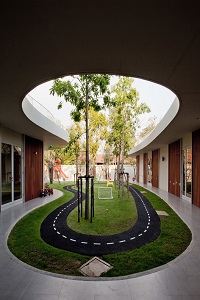Excellent early years teachers make a lasting, positive impact on children’s well-being and development, opening young children’s minds to new concepts and ideas on a daily basis. But when Stephanie Drake (pictured) attained Early Years Teacher Status at the Institute of Education in 2014, she little d reamt that her career would offer the added attraction of an idyllic life on the other side of the world.
reamt that her career would offer the added attraction of an idyllic life on the other side of the world.
Stephanie originally graduated in Journalism and Media & Cultural studies from Kingston University. By 2009, she found herself in Korea teaching English with a TEFL (Teaching English as a Foreign Language) qualification. Whilst there, Stephanie came to realise that teaching was her future. This conviction was underlined by the opportunities she was offered of working with children of all different ages, from toddlers to teenagers. The varied work gave Stephanie a valuable insight into her chosen profession and helped her to decide which stage of childhood she wanted to work with.
When Stephanie finished her contact in Korea, she knew it was time to come back to the UK to gain more qualifications.
“I knew about the long-established PGCE (Post-Graduate Certificate in Education) but whilst applying for that, I found out about this course (EYTS) which seemed far more appropriate for me,” she explained.

“The most enjoyable thing for me on the programme was having placements which ran alongside the course of study, meaning you are able to apply what you are learning back at university,” Stephanie added.
She found that the most challenging aspect of the programme was having to demonstrate skills in leadership and change management right from the beginning:
“I had to say ‘Well I know you’re already ‘Outstanding’ as a setting, but I still want to go ahead and improve such-and-such.’”
Stephanie’s next steps came quickly.
“Before I graduated I was updating my CV and I was immediately offered a job as a senior nursery nurse not far from Reading. During my time there, I was thrilled to be offered my ‘dream job’ here in Thailand.
“The location is beautiful; purpose-built and constructed with children in mind. I’ve got my own class of 16 children and am in charge of two teaching assistants and a nanny. The children go home at midday and so I have plenty of preparation time. The purpose-built design of the school and the climate of Thailand enables learning to take place both inside and outside of the classroom all year round.
“The other great benefit is that the course has enabled me to pursue my passion of travelling and teaching – being able to work in a different part of the world, and gain valuable experience working with parents and children with EAL. It’s a good contract: they pay the rent for where I live and will give me a housing allowance if I move out. I am receiving training which will be helpful for my promotion prospects.”
When asked what advice she would give to undergraduate students (not necessarily in education) who are interested in this kind of work, Stephanie said:
“If it’s something you feel passionate about, go for it, but make sure you get some experience with children first to check that you have the vocation and interest!”

Early Years Teacher Status (EYTS) is awarded to graduates who have been judged to have met all of the Teachers’ Standards (Early Years) in practice from birth to five years old. Early Years Teacher Status is the only graduate accreditation for the early years workforce.

 Keynote: Alister McGrath, Andreas Idreos Professor of Science and Religion at the University of Oxford
Keynote: Alister McGrath, Andreas Idreos Professor of Science and Religion at the University of Oxford
